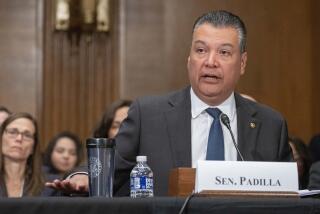Service Would Keep ID of a Caller Confidential
- Share via
A Beverly Hills lawyer has begun selling a service aimed at circumventing controversial “caller identification” systems that reveal callers’ phone numbers.
Such systems are not yet available in California, but Pacific Bell officials say they will propose offering a feature that will conceal phone numbers for free. Meanwhile, some law enforcement officials see the new private service as possibly impeding criminal investigations.
Caller identification allows recipients of phone calls to view the telephone number from which incoming calls originate. About 100,000 telephone users on the East Coast have signed up for such a service offered by Bell Atlantic, a regional phone firm. The owners of 800 and 900 lines also have the option to buy such services.
The service can cut down on harassing phone calls and allows users to screen out unwanted callers, phone company officials say. Taxi cab companies and delivery firms can use the service to verify phone numbers, cutting down on false orders.
The systems, however, have been criticized by many for violating the privacy of callers who don’t want their numbers revealed or who have paid extra to get unlisted phone numbers.
Enter attorney William F. Dwyer II, co-founder of Private Lines, along with Marvin Rudnick, a former Justice Department attorney.
Callers who want to remain anonymous dial Private Lines’ 900 service: 1-900-STOPPER for domestic calls or 1-900-RUNWELL for international calls. The caller, who pays $2 a minute for domestic calls and $5 for international calls, punches in the phone number he wants to reach and is connected via the service.
A caller identification system would display only the Private Lines number, said Dwyer, who said his company will will not match incoming and outgoing calls.
The telephone bill of Private Line customers would only show calls made to the 900 line and not the number of the person or company that was eventually reached.
“That’s the genius of it,” said Dwyer, who noted the service will help businessmen shield their telephone calls from corporate spies or attorneys. “I think it will make it a tougher job for a litigator to get into the privacy of people by subpoenaing their phone records.”
But that same feature could also frustrate law enforcement officials who often rely on phone records to show relationships between suspects, says Allen Field, who heads the major fraud division of the Los Angeles County District Attorney’s Office.
“It’s obvious that we have to see what problems it would create,” said Field. “I can’t think of a legitimate reason for this service.”
Blocking caller identification does not sit well with the phone companies that sell the service.
“We have taken a stand against blocking,” said Sandra Granzow, spokeswoman for Bell Atlantic. “We believe that all numbers should be passed to the people who are receiving the call.”
Legislation in California will require phone companies to allow callers to shield their numbers from identification systems. Pacific Bell said it will be a few years before it can offer call identification and a free sister service--Per Call Privacy.
“Per Call Privacy will enable the customers to prevent their phone number from being displayed,” said Pacific Bell spokeswoman Lissa Zanville. “By pressing a combination of three digits, they can decide per call if they can have their number displayed.”
More to Read
Inside the business of entertainment
The Wide Shot brings you news, analysis and insights on everything from streaming wars to production — and what it all means for the future.
You may occasionally receive promotional content from the Los Angeles Times.










